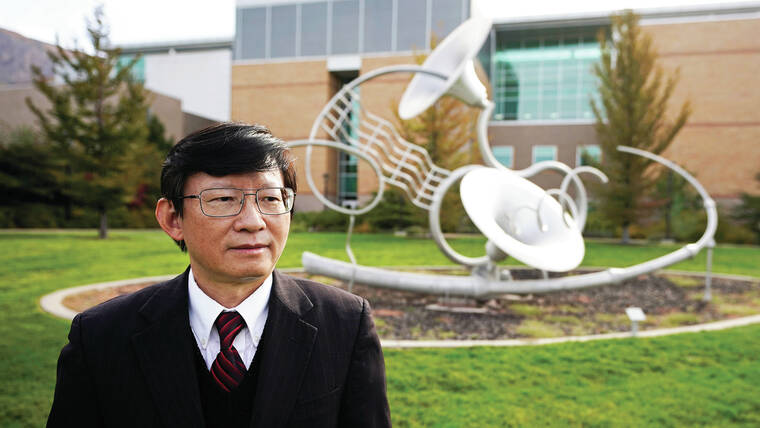Amid strained US ties, China finds unlikely friend in Utah
SALT LAKE CITY — China’s global campaign to win friends and influence policy has blossomed in a surprising place: Utah, a deeply religious and conservative state with few obvious ties to the world’s most powerful communist country.
An investigation by The Associated Press has found that China and its U.S.-based advocates spent years building relationships with the state’s officials and lawmakers. Those efforts have paid dividends at home and abroad, the AP found: Lawmakers delayed legislation Beijing didn’t like, nixed resolutions that conveyed displeasure with its actions and expressed support in ways that enhanced the Chinese government’s image.
ADVERTISING
Its work in Utah is emblematic of a broader effort by Beijing to secure allies at the local level as its relations with the U.S. and its Western allies have turned acrimonious. U.S. officials say local leaders are at risk of being manipulated by China and have deemed the influence campaign a threat to national security.
Beijing’s success in Utah shows “how pervasive and persistent China has been in trying to influence America,” said Frank Montoya Jr., a retired FBI counterintelligence agent who lives in Utah.
“Utah is an important foothold,” he said. “If the Chinese can succeed in Salt Lake City, they can also make it in New York and elsewhere.”
Security experts say that China’s campaign is widespread and tailored to local communities. In Utah, the AP found, Beijing and pro-China advocates appealed to lawmakers’ affiliations with The Church of Jesus Christ of Latter-day Saints, better known as the Mormon church, which is the state’s dominant religion and one that has long dreamed of expanding in China.
Beijing’s campaign in Utah has raised concerns among state and federal lawmakers and drawn the attention of the Justice Department.
A state legislator told the AP he was interviewed by the FBI after introducing a resolution in 2020 expressing solidarity with China early in the coronavirus pandemic. A Utah professor who has advocated for closer ties between Washington and Beijing told the AP he’s been questioned by the FBI twice. The FBI declined to comment.
‘DECEPTIVE AND COERCIVE’
Beijing’s interest in locally focused influence campaigns is not a secret. China’s leader, Xi Jinping, said during a trip to the U.S. in 2015 that “without successful cooperation at the sub-national level it would be very difficult to achieve practical results for cooperation at the national level.”
A spokesman for the Chinese embassy in Washington told the AP that China “values its relationship with Utah” and any “words and deeds that stigmatize and smear these sub-national exchanges are driven by ulterior political purposes.”
It is not unusual for countries, including the U.S., to engage in local diplomacy. U.S. officials and security experts have stressed that many Chinese language and cultural exchanges have no hidden agendas. However, they said, few nations have so aggressively courted local leaders in ways that raise national security concerns.
In its annual threat assessment released earlier this month, the U.S. intelligence community reported that China is “redoubling” its local influence campaigns in the face of stiffening resistance at the national level. Beijing believes, the report said, that “local officials are more pliable than their federal counterparts.”
The National Counterintelligence and Security Center in July warned state and local officials about “deceptive and coercive” Chinese influence operations. And FBI Director Christopher Wray last year accused China of seeking to “cultivate talent early—often state and local officials—to ensure that politicians at all levels of government will be ready to take a call and advocate on behalf of Beijing’s agenda.”
Authorities in other countries, including Australia, Canada and the United Kingdom, have sounded similar alarms.
Those concerns have arisen amid escalating disputes between the U.S. and China over trade, human rights, the future of Taiwan and China’s tacit support for Russia during its invasion of Ukraine. Tensions worsened last month when a suspected Chinese spy balloon was discovered and shot down in U.S. airspace.
LEGISLATIVE AND PR VICTORIES
U.S. officials have provided scant details about which states and localities the Chinese government has targeted. The AP focused its investigation on Utah because China appears to have cultivated a significant number of allies in the state and its advocates are well-known to lawmakers.
Relying on dozens of interviews with key players and the review of hundreds of pages of records, text messages and emails obtained through public records’ requests, the AP found China won frequent legislative and public relations victories in Utah.
China-friendly lawmakers, for example, delayed action for a year to ban Chinese-funded Confucius Institutes at state universities, according to the legislation’s sponsor. The Chinese language and cultural programs have been described by U.S. national security officials as propaganda instruments. The University of Utah and Southern Utah University closed their institutes by last year.
In 2020, China scored an image-boosting coup when Xi sent a note to a class of Utah fourth-graders thanking them for cards they’d sent wishing him a happy Chinese New Year. He encouraged them to “become young ‘ambassadors’ for Sino-American friendship.”
Emails obtained by the AP show the Chinese Embassy and the students’ Chinese teacher coordinated the letter exchange, which resulted in heavy coverage by state-controlled media in China.
A Chinese state media outlet reported the Utah students jubilantly exclaimed: “Grandpa Xi really wrote back to me. He’s so cool!” Portraying China’s most authoritarian leader in decades as a kindly grandfather is a familiar trope in Chinese propaganda.
Xi’s letter garnered positive attention in Utah, too. A Republican legislator said on the state Senate floor that he “couldn’t help but think how amazing it was” that the Chinese leader took the time to write such a “remarkable” letter. Another GOP senator gushed on his conservative radio show that Xi’s letter “was so kind and so personal.”
Dakota Cary, a China expert at the security firm Krebs Stamos Group, said in making such comments Utah lawmakers are “essentially acting as mouthpieces for the Chinese Communist Party.”


